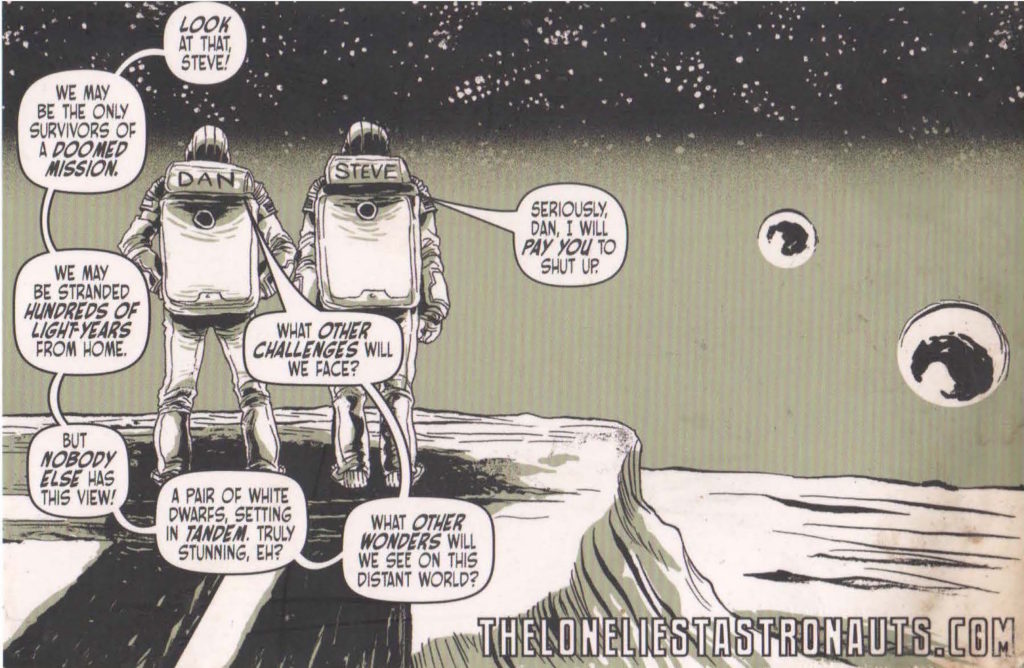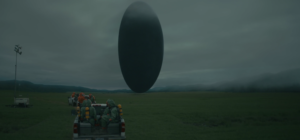Some Spoilers Below
At just under ten years old, it is safe to say that Moon is a modern classic. One DMS member described it as “Multiplicity in space!” Brilliantly acted by Sam Rockwell, Moon is the low budget, well tempered answer to Event Horizon, which, if you’re in a situation like mine, you have to watch when your partner is out of town because it will cause nightmares.
We had not watched Moon since its 2009 release, and we are pleased to report that it rewards multiple viewings. The main (almost only) characters are Sam Rockwell, who plays a few iterations of the same cloned astronaut/moon miner (conveniently named Sam), and Kevin Spacey, who plays GERTY, a computerized assistant that is one part Kubrick’s HAL 9000, one part Claptrap, and one part GLaDOS. Watching as Sam’s plight unfolds, we could not help making comparisons to The Loneliest Astronauts by Kevin Church and Ming Doyle.

Moon is, however, something entirely different and effortlessly fresh. Plus, you get to see Sam Rockwell’s tight butt and listen to him make such dad jokes as “You’re really full of yourself aren’t you Doug,” while alone and talking to an extremely full plant he’s named Doug.
Without getting too deep into the plot, Sam is Jesus. He is nearing the end of his three-year contract with Lunar Industries under which he works as a miner of Helium-3 on the dark side of the moon. The number 3 appears repeatedly throughout the film, which we believe is a reference to the holy trinity (one of the first sci fi plots known to man). Each of the lunar rovers Sam watches over like a shepherd is named after one of the apostles. It is Matthew, who valued money above all else before meeting that guy Jesus in the New Testament, that ends up causing problems for Sam.
Sam’s little mining outpost provides the Helium-3 that allows the distant residents of Earth to enjoy unlimited green energy. Just as we in the United States benefit from and are therefore complicit in the wars our countries wages as evidenced by the goods we buy, the residents of Earth are all complicit in Sam’s plight. He pays the price for our reckless consumption and greed. Sam also kind of dies and kind of gets resurrected. Just like our boy J. Sam’s daughter’s name is also Eve.
At a pivotal point in the film, Sam Prime figures out what Sam the Original already knows but refuses to accept. Sam Prime refuses to let Sam the Original’s denial continue, but when Sam Prime is yelling “Wake up!” at Sam the Original, he might also be yelling at the audience. We should all be looking for clones hidden under the edifice we and our predecessors have painstakingly constructed. Walter Kovacs knew.

The last line of the film is a radio personality (probably hopped up on OCs) yelling through the froth in his mouth about Sam Prime’s return to Earth. You can likely guess what he called him, but in light of the current scumbag’s two Executive Orders on the subject, we want to highlight that Sam Prime is referred to as an “illegal alien” in the final words of the film. If you have not read the scumbag’s lesser discussed Executive Order, linked above, you should. Section 8 purports to “empower State and local law enforcement agencies across the country to perform the functions of an immigration officer in the interior of the United States to the maximum extent permitted by law.” That is a terrifying and potentially irreversible erosion of our Fourth Amendment rights to be free from unreasonable searches and seizures.
The attention to detail throughout the film is subtle and refreshing. For example, the attorney we keep on retainer specializes in trademark law and tells us that the logo for Lunar Industries is a phenomenal trademark.

It is a Sunday afternoon. If you have not seen this movie, watch it right quick. If you have seen it, let it unfold in front of you again. You will not be disappointed.







